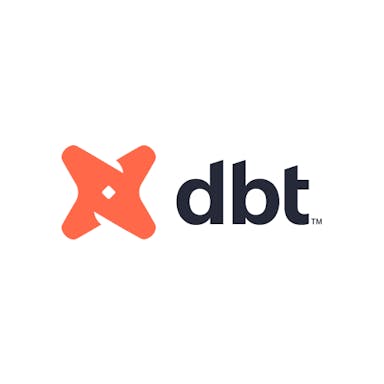Thesis
In 2025, the world is expected to generate 181 zettabytes of data, a roughly 23% increase from the previous year. However, transforming raw data into something useful is complex. As enterprises scale, their data infrastructure is fragmented across multiple teams, platforms, and deployments. The average enterprise uses five to seven different data tools, with 10% of teams using over ten platforms. Fragmentation leads to a lack of visibility into data quality, making it difficult to track and understand a company’s existing data pipeline.
Because of this complexity, organizations spend significant portions of their budget and time reacting to failures rather than proactively leveraging data systems to create value. Every year, approximately $44.5 billion in global cloud spend is wasted due to inefficient infrastructure and poor operations. Additionally, the average data engineer spends 44% of their time maintaining pipelines instead of analyzing data, costing companies approximately $520K each per year. Around 75% of data engineers feel their time and talent are wasted by manual pipeline management, resulting in a challenging developer experience, reducing the pace of innovation.
Delivering data products reliably requires teams to orchestrate, or automatically coordinate and manage, three separate layers in data pipelines: (1) data orchestration for moving and organizing data, (2) workflow orchestration for automating task sequences, and (3) infrastructure orchestration for allocating resources based on task requirements. These three layers operate independently, and changes in one area can trigger failures throughout workflows and infrastructure. A unified DataOps platform, or tools that manage all layers together, improves trust in data, reduces cloud costs by up to 40%, enhances team productivity, and secures critical data assets.
Astronomer helps companies manage and automate how their data moves across different tools and systems. Its main product, Astro, is an orchestration platform that unifies every layer of the data stack, allowing teams to centrally build, run, and observe their workflows. Astronomer is built around Apache Airflow, an open-source tool used to create data workflows. As businesses utilize more data for applications such as AI and everyday decision-making, a single platform that manages data workflows can help identify issues, automate tasks, and make systems more reliable.
Founding Story
Astronomer was founded in 2015 by Ry Walker (former CEO), Greg Neiheisel, and Tim Brunk. The three met in 2014 while starting USERcycle, an engagement analytics tool. While building USERcycle, they struggled to onboard users and encountered a deeper pain point: businesses lacked control over their data, making it difficult to use tools like USERcycle effectively. At a conference in Las Vegas in May 2015, the team made a spontaneous decision to pivot, shifting their focus to the underlying problem of data extraction and transportation. A few days later, they applied to the startup accelerator AngelPad with their new idea for Astronomer.
The first version of Astronomer (v0.5) ran on Amazon’s Simple Workflow Service, but its minimal interface didn’t provide enough insights, and debugging was difficult. The team evaluated a number of open-source alternatives in 2016, including Luigi, Oozie, and Azkaban, but found each lacking in usability, scalability, or adaptability. The team eventually selected Apache Airflow, a workflow orchestration platform originally developed at Airbnb in 2014, and formally committed to building on top of it in May 2018.
Airflow is a platform for programmatically authoring, scheduling, and monitoring data workflows. It was open-sourced in 2015 and is a widely adopted tool across enterprise data teams. As of November 2024, Airflow had over 31 million monthly downloads and usage across 77K organizations. While Airflow provides a strong foundation, users experience challenges with implementation and maintenance. Astronomer built a managed orchestration layer around Airflow to improve its scalability, reliability, and developer experience.
Astronomer is embedded in the Airflow community, having contributed to 55% of Airflow’s code and driven 100% of new releases, according to the company. As of July 2025, Astronomer had 18 of the top 25 Airflow committers and 10 Project Management Committee (PMC) members on staff.
Walker, Astronomer’s founding CEO, previously founded web agency Sharkbytes and Differential, a startup studio and MVP builder. Astronomer’s early team also included Pete DeJoy (who became CEO in July 2025), Viraj Parekh (VP of Sales Engineering), Paola Peraza Calderon, Ash Berlin-Taylor, Brad Kirn, Kaxil Naik, and Ben Gregory. Berlin-Taylor and Naik have served as Apache Airflow PMC members and directors.
Walker stepped down as CEO when Astronomer hit its growth stage, and later fully exited the company in 2023 to build his new venture, CoreDB. In 2018, Joe Otto joined as CEO. Otto oversaw the release of Astro, Astronomer’s flagship product, in June 2022. The same year, Astronomer acquired Datakin, a data observability platform founded by the creators of OpenLineage and Marquez.
In 2022, board member Scott Yara briefly joined Otto as co-CEO before Otto stepped down in January 2023 following a 20% workforce reduction, where 76 employees were laid off. In 2023, Otto stated, “We hired too many people too fast,” and the company announced a needed shift to a simplified organizational structure.
Andy Byron was appointed CEO in 2023. Byron previously led software and cybersecurity firms, including as President of Lacework, CRO of Cybereason, and President of Fuze. Following Astronomer’s Series D round in May 2025, Nathan Owen, general partner at Grand Ventures, stated, “[Byron] and his leadership team have been putting on a master class in execution.” However, in July 2025, Byron resigned days after a viral scandal at a Coldplay concert involving Kristin Cabot, Astronomer’s Chief People Officer. As of July 2025, DeJoy was serving as CEO.
Product
Astro
Astronomer’s flagship product, Astro, was released in 2022 to simplify the development, monitoring, and scaling of data pipelines. Astro is a fully managed SaaS application unifying all steps of the data stack, allowing teams to shift their focus from their infrastructure to effectively using data.
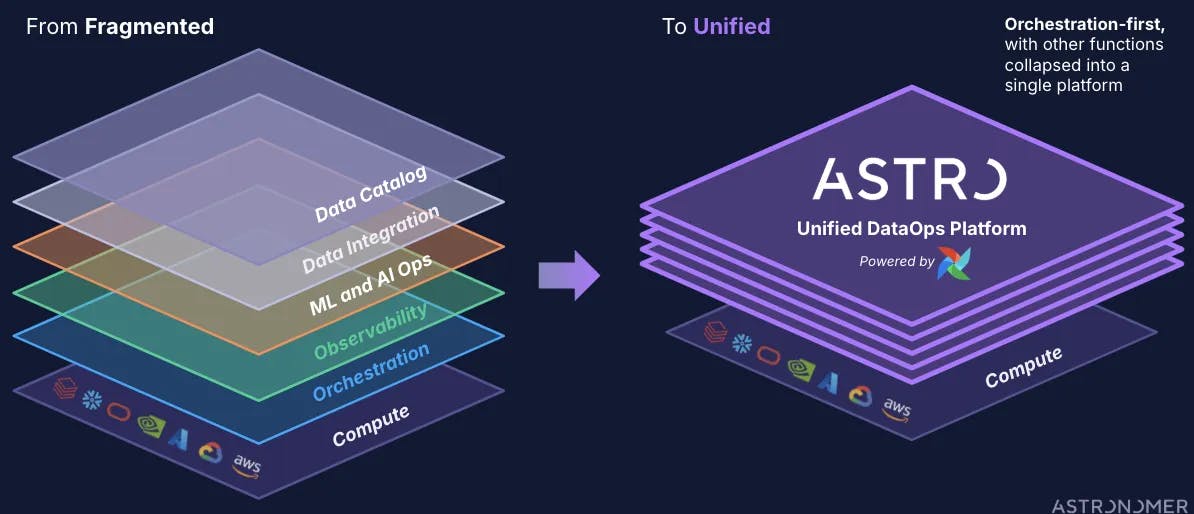
Source: Astronomer
Architecture: Users can interact with Astro using its UI, CLI, or API. Astro is a cloud-native platform running on major cloud providers, including Astronomer’s managed cloud, Amazon Web Services (AWS), Google Cloud Platform (GCP), and Microsoft Azure. Multi-cloud support allows teams to deploy and scale their data pipelines in the environment best suited for their infrastructure and compliance needs.
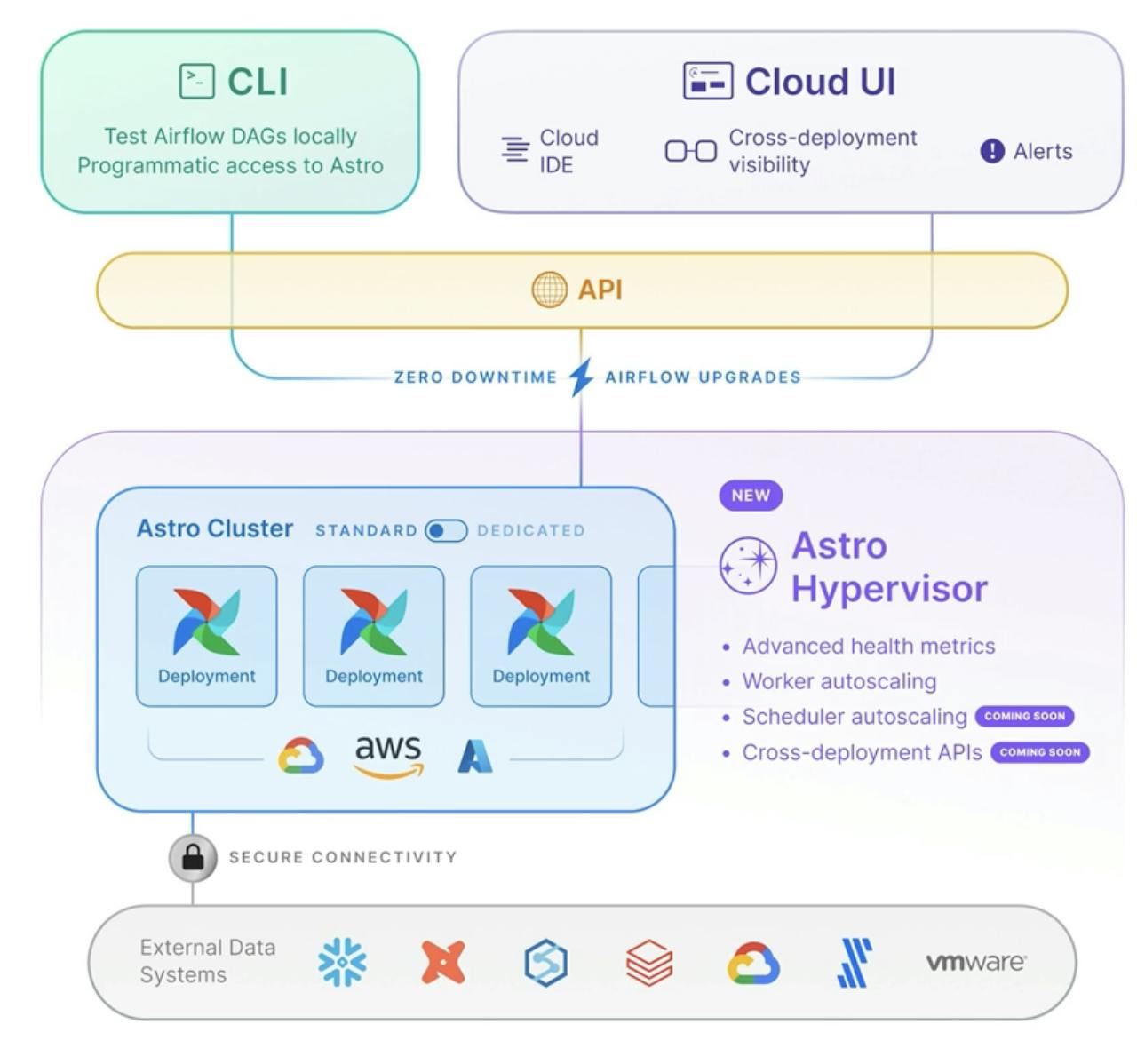
Source: Astronomer
Build: In Airflow, workflows are represented as Directed Acyclic Graphs (DAG), or a flowchart of ordered tasks creating a single data pipeline. A DAG defines the dependencies and execution order of tasks, ensuring data flows correctly through each step.
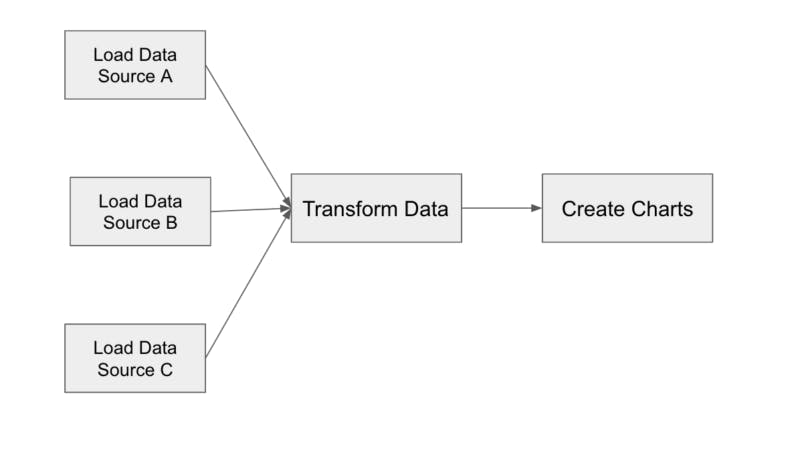
Source: Qubole
Within a DAG, a task is a single unit of work performing a specific operation. Each task’s behavior is determined by an operator, which falls into three categories: action operators that execute a task, transfer operators that handle data movement, and sensor operators that run a task under a specific condition.

Source: Astronomer
Astro builds on the foundation of Airflow by providing an interface where users can create, schedule, and monitor DAGs. Users can visualize the status of individual tasks, manage retries on failure, and track the overall health of pipelines, all without the need to manually manage Airflow infrastructure.
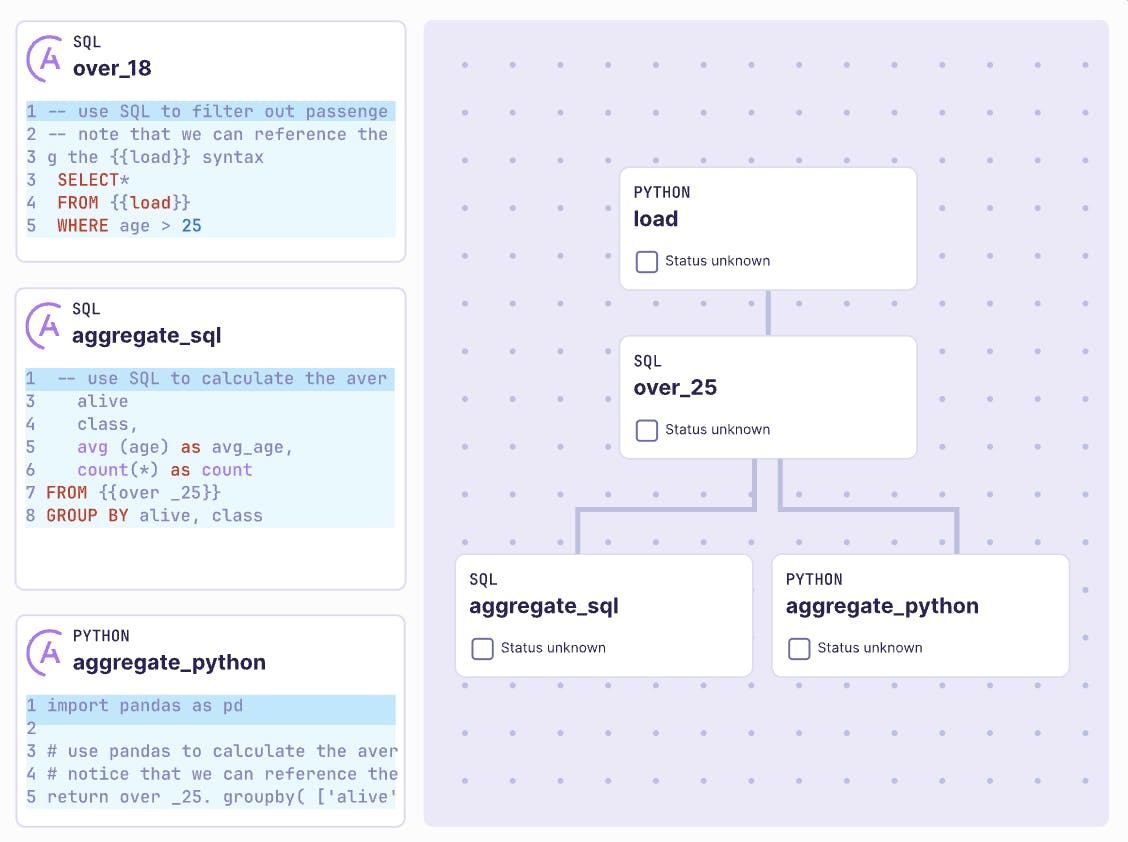
Source: Astronomer
Run & Scale: A deployment is a hosted Airflow environment on Astro and can be created through the Astro UI or CLI. Deployments are powered by Astro Runtime, Astronomer’s core execution environment. Astro Runtime ensures Airflow operates reliably at scale, eliminating the need for users to manage their own Airflow environments.
Workspaces group deployments by teams, making it easier to manage access and organization. All deployments run on Kubernetes clusters managed by Astronomer, which include the compute, networking, and databases needed to support Airflow. Users can implement both standard clusters, which are pre-configured by Astronomer, or dedicated clusters, which can be customized by organizations with additional configuration options.
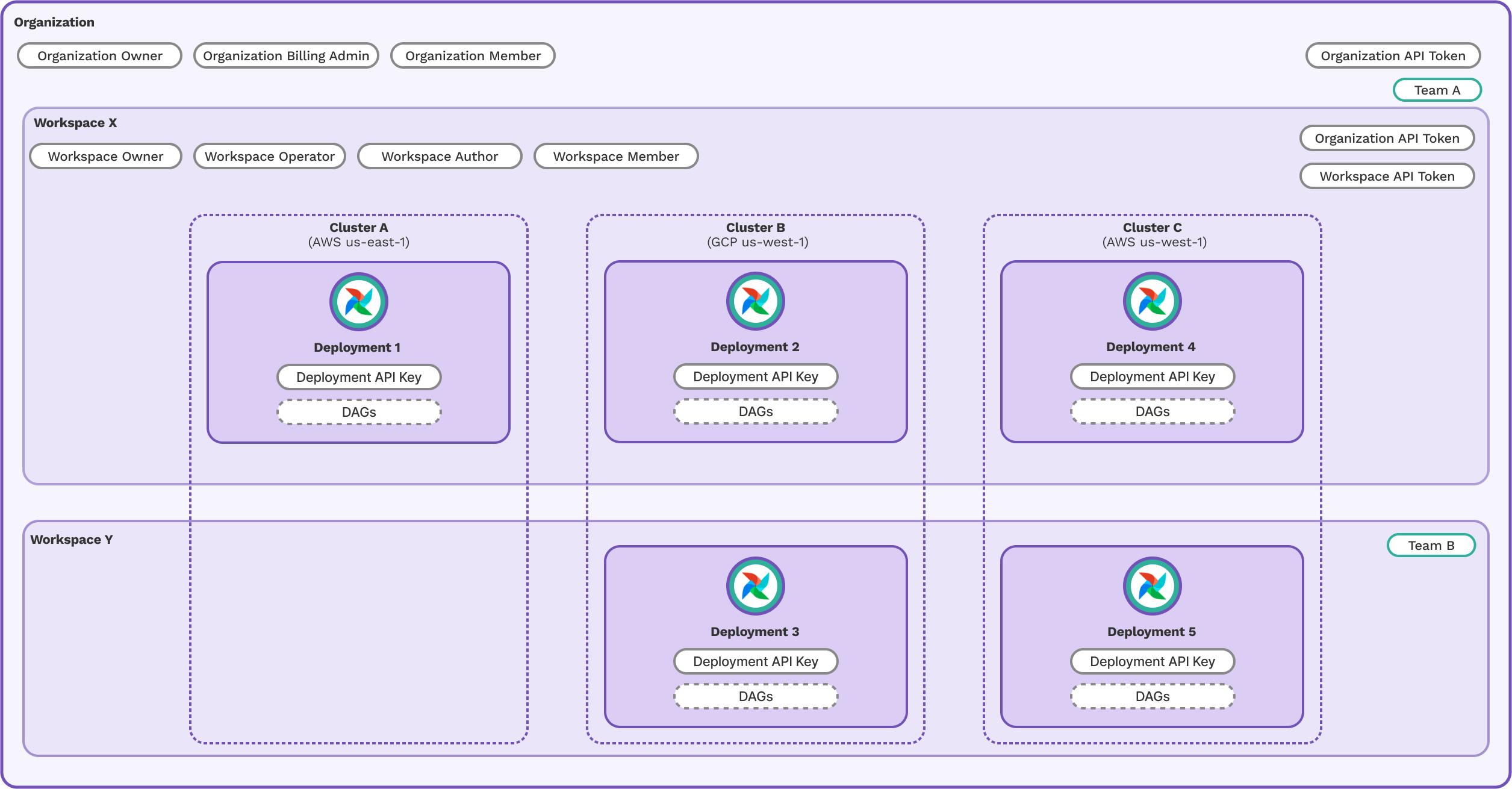
Source: Astronomer
Astro was designed to automatically scale infrastructure, eliminating the need for customers to manually configure resources. At its core is the Astro Hypervisor, an Astronomer-managed component that monitors workloads and optimizes compute resources. Astro Hypervisor determines the right configurations to run each deployment, scaling resources up or down based on usage patterns.
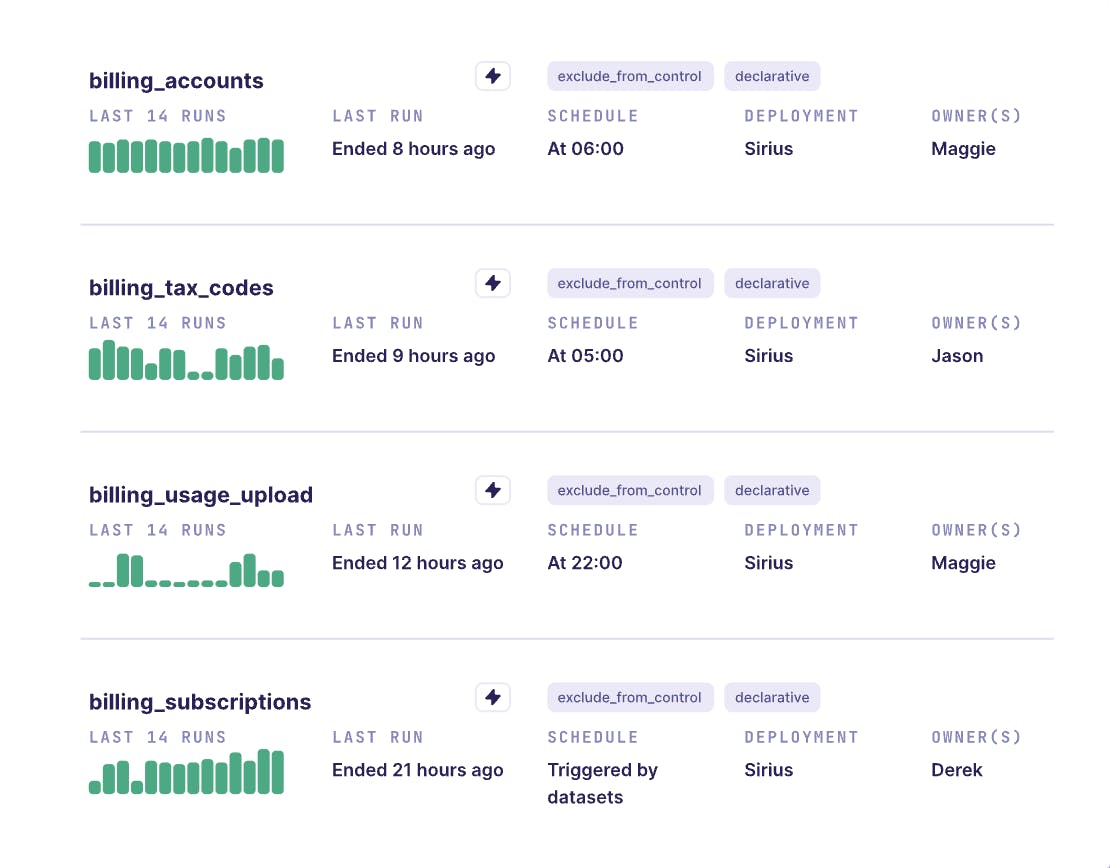
Source: Astronomer
Security: Astro supports task isolation, ensuring each task runs in its own containerized environment, reducing the risk of data leakage. Astro also enables remote execution, allowing users to run tasks in isolated environments to ensure code remains secure.
Future-Proof: Astronomer works closely with Airflow, having driven 100% of Airflow releases and contributed to 55% of Airflow code. Users have day-zero access to new Airflow features on Astro. Airflow 3.0 was released in April 2025, following four years of development, and introduced new features that enable remote execution, event-driven scheduling, multi-language task execution, and more.
Astro Observe
Astro Observe is part of Astro’s built-in observability layer, enabling customers to gain pipeline-level visibility within their workflows. Powered by OpenLineage, a data lineage framework that automatically collects and correlates information about pipeline behavior. Issues can be quickly identified and resolved, with key features including a Data Health Dashboard for monitoring performance and AI-generated log summaries to accelerate incident response. Through actionable insights, Astro Observe helps data teams improve reliability, compliance, and efficiency.
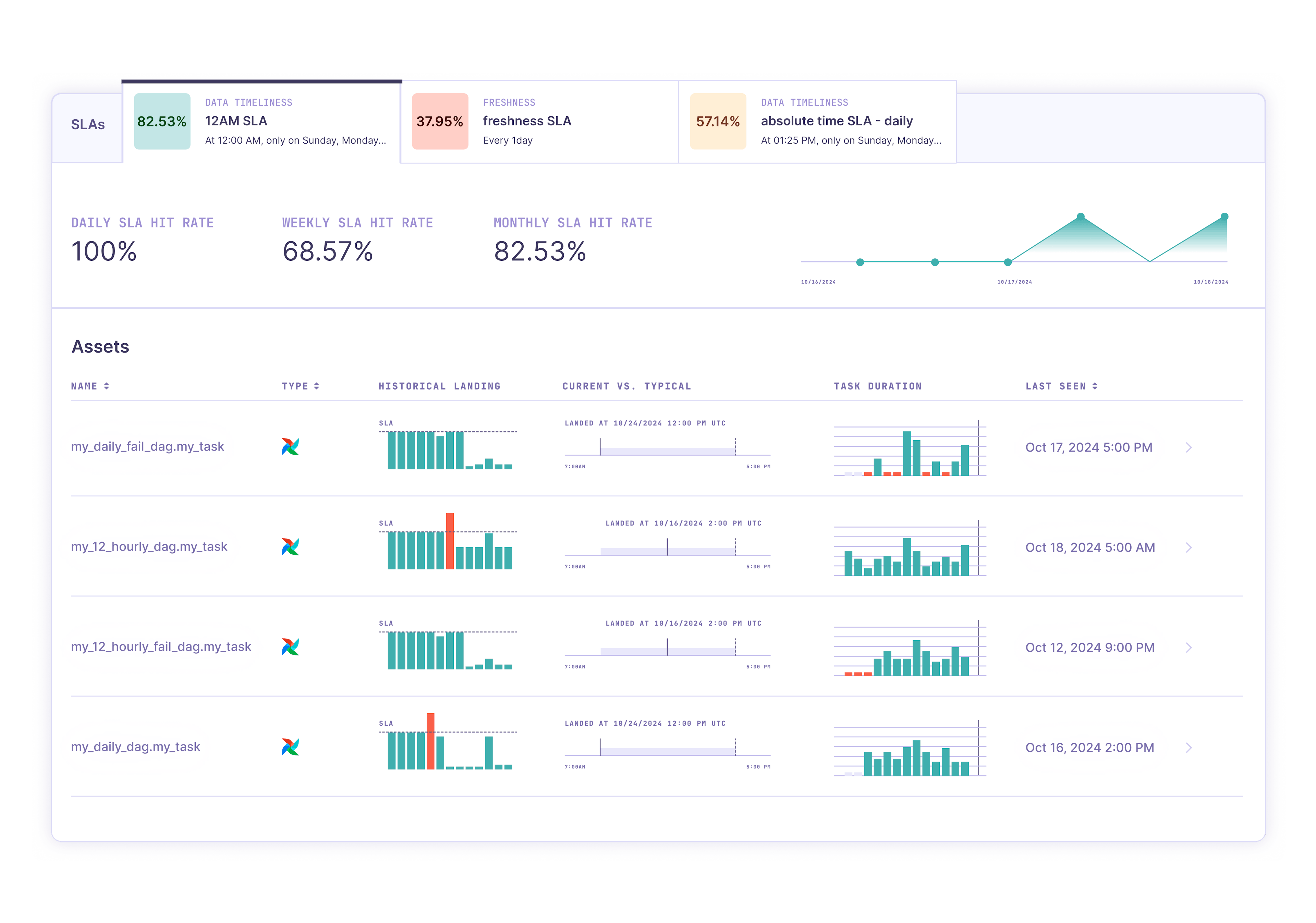
Source: Astronomer
Astronomer Software
For teams that have strict infrastructure requirements, such as wanting full control over their network, keeping data in a private cloud, or supporting custom environments, Astronomer offers self-managed deployment. Organizations can run on Astronomer’s software with their own infrastructure, giving them complete control over configurations, updates, and data governance.
Additional Tools
Cosmos: The Cosmos library simplifies the orchestration of data build tool (dbt), an open-source framework transforming raw data into clean datasets using SQL. Cosmos enables integration of dbt projects into Airflow by automatically generating Airflow tasks from dbt models. By eliminating manual DAG creation, teams can streamline development and deployment.
Registry: Astronomer’s Registry centralized repository of reusable DAGs, providers, and integrations. Users can discover, share, and deploy prebuilt components to accelerate pipeline development.
Learning: Astronomer offers various resources to support users. For example, AI-powered chatbot Ask Astro answers questions about Astro and Airflow. Additionally, Astronomer Academy is a library of free, self-paced video courses focused on Airflow fundamentals and Astro workflows. Finally, Astronomer regularly releases webinars and podcasts for learning.
Market
Customer
Astronomer serves a range of industries managing large volumes of data, including financial services, healthcare, retail, and manufacturing. Its services are suited for mid-to-large enterprises that are managing complex data pipelines and are seeking to reduce orchestration overhead, as Astro can reduce Airflow infrastructure costs by 45%.
Notable customers such as Adobe, Marriott, Ford, Sweetgreen, and Foot Locker demonstrate the platform’s broad applicability. For example, healthcare company Leap Metrics scaled from 45 to 217 DAGs with Astro and saved 10 hours a week previously spent on troubleshooting Airflow. Additionally, streaming platform Atmosphere.tv saved $10K annually in infrastructure costs with Astronomer.
Astro is most cost-effective for teams already invested in Airflow. However, though possibly time-consuming, it is possible for teams to adopt Airflow. For example, Astronomer helped Autodesk migrate its critical workflows from Apache Oozie to Airflow in 12 weeks.
Airflow is considered an industry standard, with other adopters of the open source framework including Apple, Uber, Bloomberg, and LinkedIn. While Astro integrates with all major cloud providers, adoption may depend on ecosystem compatibility and internal security requirements. Some customers may choose cloud-native alternatives (e.g., AWS MWAA or Google Cloud Composer) due to stricter compliance needs.
Market Size
Astronomer competes in the data orchestration space as a full-stack DataOps solution. In 2025, the global data orchestration tool market is estimated to be $20.3 billion and is expected to reach $75.4 billion by 2032. As companies shift toward hybrid and multi-cloud environments, with 89% of enterprises operating across more than one cloud provider, the complexity of managing data workflows drives the need for an orchestration solution. By 2027, it is estimated that 90% of organizations will use orchestration services to automate workflows and data pipelines.
Airflow is a widely used orchestration tool, with over 77K organizations using it in November 2024. The number of Airflow DAG runs increased by 48% YoY in 2024, indicating growing engagement. This momentum may accelerate with the growth of AI, and it is estimated that 80% of software companies will offer generative AI features in 2026, which will require even more sophisticated data infrastructure. These systems depend on complex, reliable data pipelines for their models that orchestration platforms can manage. The growth in the data orchestration space is also seen outside of software companies. At the end of 2024, telecommunications, manufacturing, and the financial industry held the largest shares of the orchestration market, with the healthcare sector also estimated to see prominent growth leading up to 2030.
Competition
Competitive Landscape
Astronomer competes primarily with managed Airflow platforms offered by major cloud providers such as Google and Amazon. In addition, it faces competition from other orchestration platforms built on alternative frameworks, including Dagster and Prefect.
Airflow-Based Orchestration Platforms
Amazon Managed Workflows for Apache Airflow (MWAA): Launched in 2020, MWAA is a managed Airflow service running on AWS, which holds ~30% of the global cloud infrastructure market. MWAA integrates tightly with AWS services such as Amazon S3, Amazon RDS, and AWS Identity and Access Management (IAM) for storage, databases, and authentication needs. Organizations deeply invested in the AWS ecosystem may prefer MWAA. However, MWAA offers less customization compared to Astro, which supports multi-cloud deployments and maintains a closer partnership with the Airflow open-source community. According to Astronomer, tasks on Astro start over 3x faster than on MWAA.
Azure Data Factory (ADF): Released by Microsoft in 2015, ADF is a managed cloud service focused on data transformation. In 2023, Microsoft introduced Airflow support through its Azure Workflow Orchestration Manager. With Azure holding ~20% of the global cloud market, ADF offers overlapping features with Astro. While ADF is not a direct competitor as a full orchestration platform, when combined with other tools, it can replicate some of Astro’s full-stack capabilities.
Google Cloud Composer (GCC): Introduced in 2018, GCC is GCP’s fully managed Airflow orchestration service. Google Cloud accounts for ~12% of the global cloud infrastructure market. GCC runs on Google Kubernetes Engine (GKE) and is fully managed by Google. According to Astronomer, Astro offers greater customization for data location, deployment, and networking. Astro tasks also reportedly start approximately 2x faster than GCC, and companies switching from GCC to Astro have reported cost savings of up to 48%. However, organizations strongly integrated with GCP may prefer GCC.
Alternative Orchestration Frameworks
dbt Labs: dbt Labs was founded in 2016 and, as of August 2025, had raised a total of $414 million in funding with notable investors like Salesforce Ventures, Sequoia, Snowflake, and Databricks. Its last known valuation was $4.2 billion in February 2022, though as of August 2025, the company was valued in secondary markets at $1.7 billion. dbt Labs develops data build tool (dbt), an open-source tool that transforms raw data into clean datasets using SQL. The company also offers dbt Cloud, a platform for developing, scheduling, monitoring, and deploying dbt projects. However, dbt Cloud does not provide infrastructure management and focuses specifically on data transformation rather than full-stack orchestration, making it an indirect competitor to Astro. dbt can also be used within Astro with Cosmos.
Dagster Labs: Founded in 2018, Dagster Labs (formerly Elementl) is the team behind Dagster, an open-source orchestration tool, and Dagster+, its managed SaaS platform. As of August 2025, the company had raised $47 million in total funding from notable investors like Sequoia, Index, Amplify, Slow, and Georgian, with a post valuation of $133 million as of March 2023. Dagster is a direct competitor to Airflow, offering a unified control plane for teams to build and manage data pipelines. While Airflow is task-based, focusing on what should run in pipelines, Dagster is asset-based, emphasizing what data is created and how it’s connected. As of August 2025, Dagster has 13.9K stars on GitHub compared to Airflow’s 41.8K.
Prefect: Founded in 2018, Prefect had raised a total of $43.6 million as of August 2025 from notable investors like Bessemer Venture Partners and Positive Sum, with a valuation of $311 million as of August 2021. Prefect is an open-source workflow orchestration tool where workflows (called Flows) are defined in Python. As of August 2025, the company had 20.2K stars on GitHub. Its commercial offering, Prefect Cloud, provides a hosted control plane to manage and orchestrate workflows. Unlike Astro, Prefect Cloud is not a full, unified DataOps platform but appeals to teams seeking flexible, Python-native orchestration. Prefect writes natural code, whereas Airflow supports a multi-language ecosystem and follows a DAG-based orchestration framework.
Business Model
Astronomer operates on a usage-based pricing model determined by factors such as the size of the Airflow cluster, the number of active deployments, and the amount of compute resources (e.g., workers) utilized.
For Astro, the pricing varies depending on team needs. For smaller teams getting started: deployments range from $0.35 / hour to $1.54 / hour, or $252 / month and ~$1.1K / month when running continuously for 30 days. For teams running pipelines in production, deployments range from $0.42 / hour to $4.16 / hour, or about $302 to ~$3K per month.
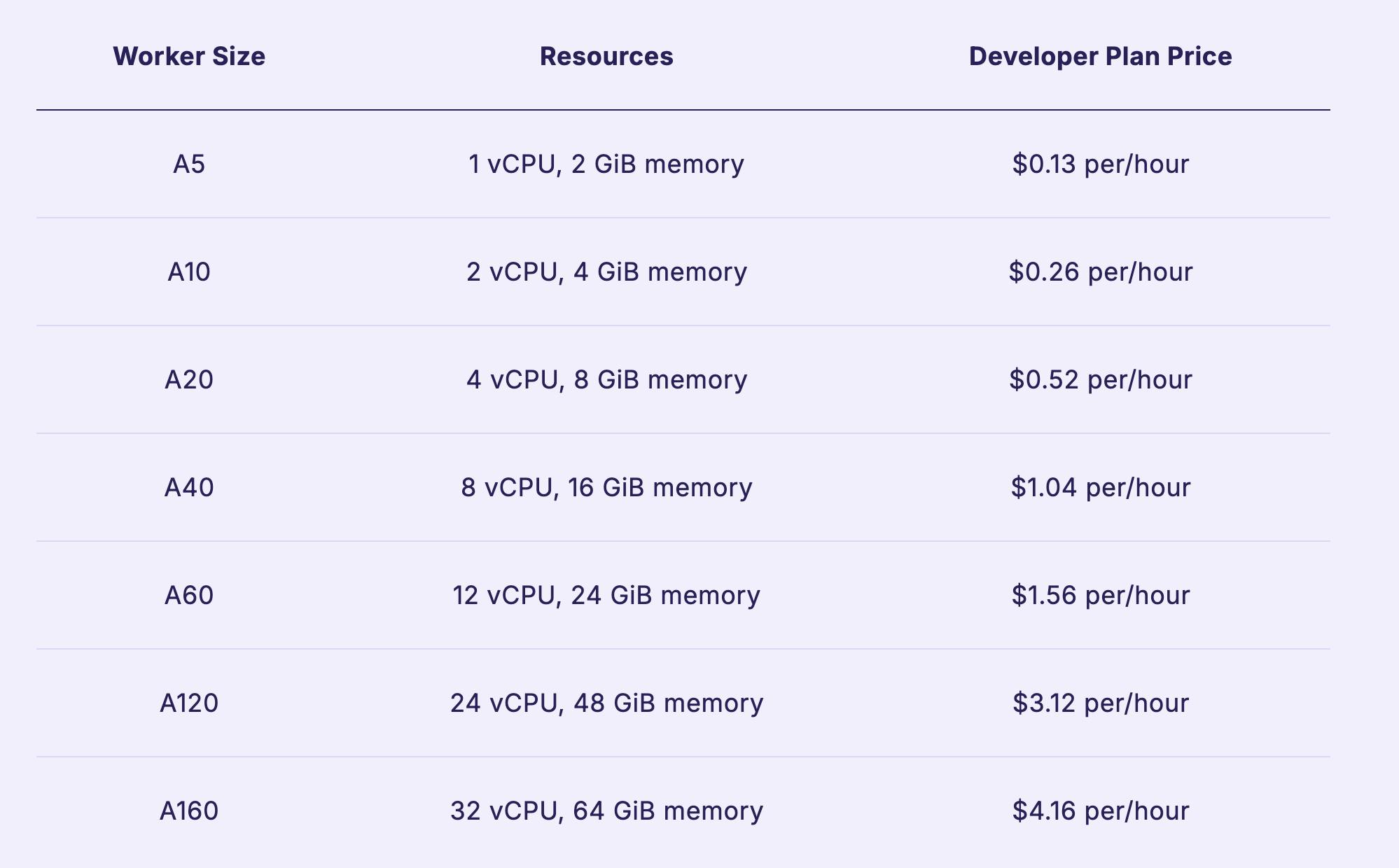
Source: Astronomer
These standard pricing tiers differ from High Availability deployments, which range from $0.70 / hour to $3.08 / hour. Additionally, dedicated clusters cost around $2.40 / hour. Enterprise clients typically enter into custom annual pricing agreements.
Astronomer Cloud pricing is further based on “Astronomer Units” (AU). In Spring 2021, one AU consists of 0.1 CPU and 0.375 GB, costing $10 per month. For Astronomer’s Software, its pricing differs on a case-by-case basis.
Astronomer also monetizes Astro Observe, under two pricing tiers: Observe Team (supporting up to 10 data product SLAs) and Observe Business (supporting up to 75 data product SLAs).
Traction
According to one unverified estimate, Astronomer reached $39.5 million in revenue as of August 2025. The company reported that it had seen over 150% YoY ARR growth for its product Astro. In November 2024, more than 700 enterprises used Astro to orchestrate their data workflows. Over one billion tasks were executed in 2024, which was a 1,774% increase from 2023.
Additionally, Astro reported to deliver a 438% ROI in under six months. Astro users have seen a 70% reduction in downtime for critical Airflow services and saved 75% of the time typically spent managing Airflow infrastructure, amounting to more than 4.2K hours of development time saved. In one case, a company with 4K employees and $200K in annual Airflow infrastructure costs saved $1.4 million over a three-year period.
The adoption of Airflow is continuously growing. In November 2024, Airflow had 31 million monthly downloads, 3K+ contributors, and 77K organizations as of November 2024, which were ~85×, ~2.3×, and ~3× greater when compared to 2020. Additionally, over 85% of Airflow users expect Airflow to be used more in their organizations. Astronomer is also looking to expand globally, having announced a new office in London to meet increased demand in the area.
Valuation
In May 2025, Astronomer raised a $93 million Series D at a $775 million valuation, bringing its total funding to $375.9 million. The round was led by Bain Capital Ventures, with participation from Salesforce Ventures, Insight Partners, and Venrock. This valuation reflected a 48% decline from the ~$1.5 billion valuation at its March 2022 Series C round, which raised $213 million led by Insight Partners and supported Astronomer’s acquisition of Datakin.
While Astronomer’s core offering is data orchestration through Airflow, the company shares strategic and structural similarities with various public companies. Snowflake (SNOW), founded in 2012, is a cloud-native data platform that integrates into pipelines. Confluent (CFLT), founded in 2014, created a managed service for Apache Kafka as a unified streaming platform. Datadog (DDOG), founded in 2010, is a monitoring and observability platform for cloud applications. These companies target similar customers and focus on real-time, scalable data operations.
As of July 2025, Astronomer was supposedly at $39.5 million in revenue, and was valued at $775 million in its May 2025 Series D round, implying a ~19.6x revenue multiple. That’s relative to public comps that trade at a range of ~7.7-18.3x LTM revenue.
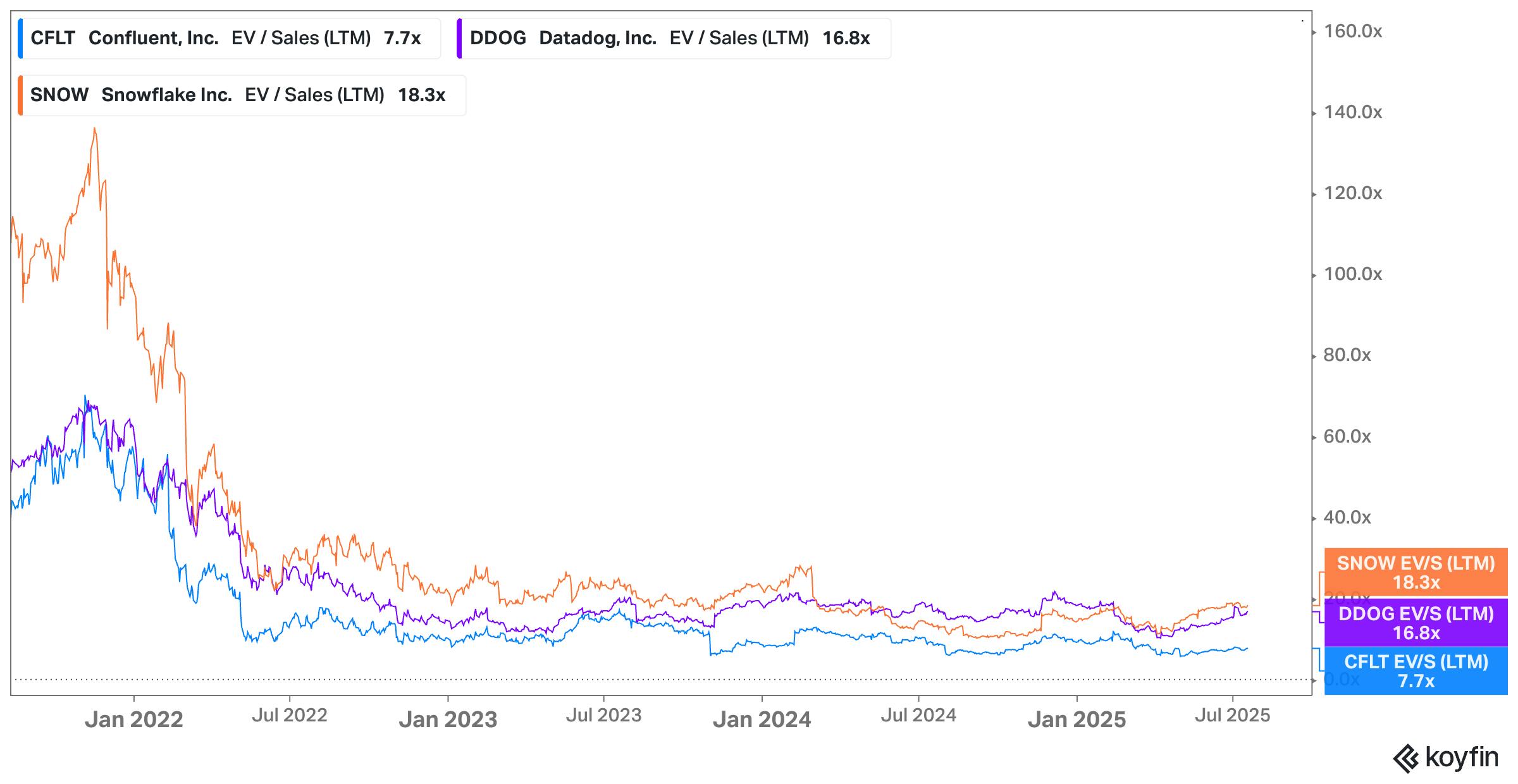
Source: Koyfin
Key Opportunities
AI’s Data Dependency
An AI data pipeline is a structured system that automates the transformation of raw data into usable insights to support the development, training, and deployment of AI models. A strong pipeline architecture supports iterative model development and complex ML workflows while enhancing data-driven decision-making, especially when built on scalable cloud platforms.
The need to effectively deliver LLMs the right data on time makes orchestration tools like Airflow a critical infrastructure. Maintaining reliable data pipelines is increasingly critical. Astro Observe can predict potential pipeline failures before they impact business operations, making it optimal for companies dealing with large amounts of data, like AI models. Additionally, the Astronomer’s “global supply chain graph” feature provides visibility into data lineage and operational dependencies, helping teams understand the relationships between data assets and workflows.
In 2023, 28% of Airflow users used Airflow features to create AI/ML pipelines, and Astronomer’s recent growth stems from customers leaning into MLOp and GenAI use cases. New releases improve Airflow’s features with AI/ML use cases. For instance, Airflow 3.0 supports AI Inference Execution, or the process of using a trained ML model to make predictions or decisions based on new data.
Geographic Expansion
Astronomer is using part of its Series D funding to strategically expand the company’s international presence. In May 2025, the company opened a new office in London to address its growing momentum in the Europe, Middle East, and Africa (EMEA) region. In 2025, over 21K organizations in EMEA depend on Airflow, with 190+ Astronomer customers in EMEA, and over 941 million annualized task runs in EMEA, representing 34% of global task runs. From 2024 to 2025, Astronomer’s EMEA regional team has tripled.
Astronomer’s momentum is supported by its commitment to regulatory compliance, such as the EU’s Digital Operational Resilience Act (DORA), which is especially relevant for financial institutions in Europe. Additionally, in July 2025, the company is actively hiring Enterprise Account Executives in major US cities like Los Angeles, San Francisco, and Austin to accelerate sales and customer acquisition.
As of May 2025, Astronomer is looking to expand their offerings in Astro, such as layering additional capabilities around the core data orchestration, like observability, lineage, data quality, integrated dbt workflows, cost optimization, and other capabilities.
Partnerships
In July 2025, Astronomer and AWS announced a strategic collaboration agreement (SCA) to help customers accelerate their data movement to AWS with Astro. This collaboration will allow customers to simplify Airflow migrations to the cloud and enable enterprises to deploy Astro through the AWS Marketplace.
In March 2025, Astronomer announced a collaboration with IBM to embed Astro within IBM’s data and AI stack. This partnership improves Astro’s appeal to compliance-sensitive organizations with complex data landscapes.
Astronomer also partners with leading cloud and data platforms, including Snowflake, Microsoft Azure, and Google Cloud. These integrations make Astro a prevalent orchestrator across modern data stacks.
Key Risks
Competitor Side Risks
Astronomer faces competition on two major fronts. Firstly, major cloud providers like AWS, GCP, and Azure offer their own managed Airflow Services that are tightly integrated into their ecosystem. Customers may be inclined to choose native tools for simplicity. For example, MWAA is deployed directly from the AWS console with pre-configured IAM permissions, creating less onboarding friction.
Additionally, while Airflow is widely adopted, other orchestration frameworks such as Dagster and Prefect offer different approaches that could appeal to teams with other data infrastructure needs. For instance, Dagster has an asset-based approach for its pipelines, which could be more useful for teams focused on data lineage. Additionally, Prefect supports serverless and event-driven orchestration, increasing flexibility for dynamic workflows. If enterprise preferences shift toward these other tools, Astronomer may face challenges adapting its Airflow-centric approach.
Security & Compliance
Astronomer operates in a high-compliance environment, with high expectations for its infrastructure. Compliances, including SOC2, GDPR, ISO 27001, and DORA, need high attention. Failure to meet evolving regulatory or customer-specific compliance requirements could block customer adoption or renewals. Enterprises with high security needs may turn to established cloud providers, such as MWAA and GCC.
Management Turnover
In July 2025, a widely circulated video of former CEO Byron and CPO Cabot at a Coldplay concert drew intense media scrutiny. The original TikTok video amassed over 127 million views and 10.8 million likes as of July 25, 2025, and has since been reported on by major news outlets and turned into internet memes. As DeJoy stated on July 21, 2025,
“The events of the past few days have received a level of media attention that few companies—let alone startups in our small corner of the data and AI world—ever encounter. The spotlight has been unusual and surreal for our team and, while I would never have wished for it to happen like this, Astronomer is now a household name.”
Following the viral scandal, Astronomer released a public statement on July 19, 2025, and stated, “Our leaders are expected to set the standard in both conduct and accountability, and recently, that standard was not met.” Byron resigned, and DeJoy stepped up as interim CEO on July 18, 2025. As the board searches for a permanent CEO, Astronomer may experience turbulence as leadership changes. However, if Astronomer manages the transition effectively, the scandal may not impact the company’s core business and could even have an awareness benefit, such as the company’s response in a response video with Gwyneth Paltrow.
Summary
The demand for data continues to grow rapidly, but many organizations still rely on fragmented tools spread across workflows, platforms, and environments. This fragmentation creates challenges in reliability, scalability, and visibility, and approximately $44.5 billion in global cloud spend is wasted due to underutilized infrastructure and inefficiencies in operating procedures. With increasing reliance on data for AI and machine learning, alongside the central role data plays in business, a full-stack orchestration platform is needed to provide greater control, visibility, and observability of data.
Built around Apache Airflow, Astronomer provides an orchestration platform unifying every layer of the stack, allowing data teams to centrally build, run, and manage their workflows. Astronomer provides a flexible and customizable alternative to cloud-native incumbents like Amazon MWAA and Google Cloud Composer. As of August 2025, over 700 enterprises use Astro. While adoption is growing, the key question is whether Astronomer, and Airflow, will become the industry standard for data orchestration.

